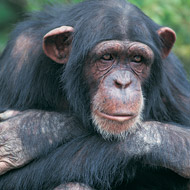Chimps possess cooking skills, study finds

A series of experiments was conducted on chimpanzees to see whether they possessed the cognitive abilities needed to cook.
Chimpanzees possess the fundamental skills needed for cooking, according to a new study.
Findings, published in Proceedings of the Royal Society B, suggest that chimpanzees and humans share several of the essential psychological capacities needed to cook food.
The study also suggests that humans may have developed the ability to cook not long after they learned how to control fire.
The transition of diet to cooked foods was a fundamental change for humans. However, understanding when and how this dietary shift occurred is a pressing problem for biologists.
To find out when the ability developed, Dr Felix Warnerken and Alexandra Rosati of Harvard University conducted a series of experiments on chimpanzees to see whether they possessed the cognitive abilities needed to cook.
They discovered that chimpanzees preferred cooked foods over raw foods and were even willing to pay greater temporal costs in order to acquire cooked foods.
Chimpanzees showed further self-control by willingly giving up possession of raw food in order to transform them.
Furthermore, it was found that chimps can transport food as well as save their raw food in anticipation of future opportunities to cook.
Dr Warneken explains that although chimpanzees possess this set of skills, they do not actually cook their food because they do not have the ability to control fire or trust other chimps not to steal their food.
Speaking to the BBC, Dr Warneken said: "Trust is another component for cooking to become a practice in a social group.
"This is required in addition to the individual psychological capacities that we targeted in our experiments."



 The Veterinary Medicines Directorate (VMD) is inviting applications from veterinary students to attend a one-week extramural studies (EMS) placement in July 2026.
The Veterinary Medicines Directorate (VMD) is inviting applications from veterinary students to attend a one-week extramural studies (EMS) placement in July 2026.